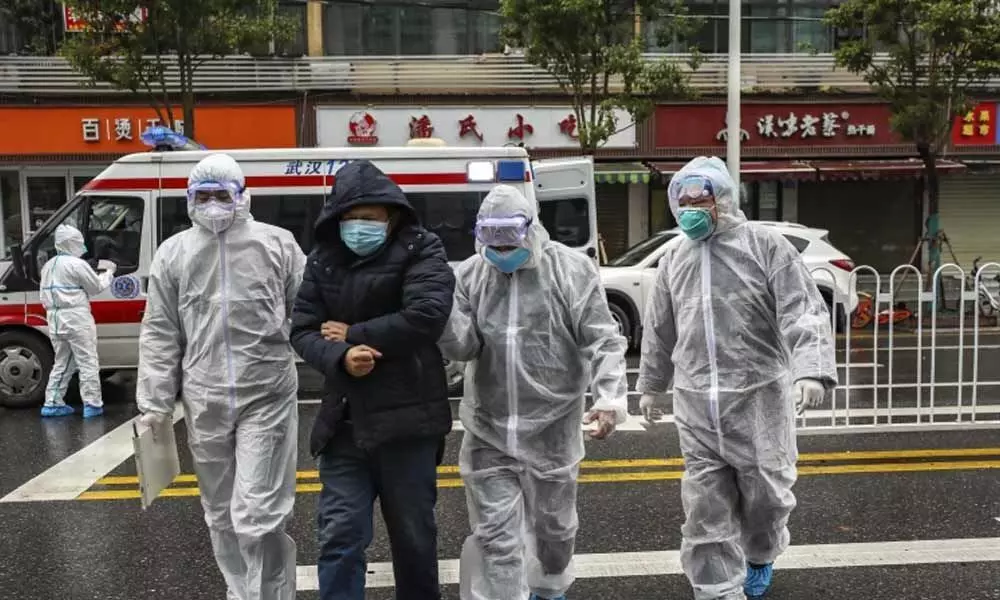Live
- ‘Get Set, Grow Summit 2024’ Focuses on Digital Detox for Families
- Stokes motivates his team to put in extra effort, says England pacer Potts
- From overcoming setbacks to leading India in U19 Women’s Asia Cup, Niki Prasad's amazing journey
- Driving Enterprise Security: Inside Venkata Reddy Thummala’s Leadership Journey
- Constitution debate: PM Modi hails 'Nari Shakti'; makes strong pitch for 'United Bharat’
- Abhijeet Bhardwaj: Revolutionizing Enterprise Analytics with Innovation and Expertise
- Bihar: Inquiry initiated against principal who went to buy veggies during school hours
- Press Sri Lankan Prez for release of Indian fishermen: TN Cong MP to EAM Jaishankar
- TN: DMK postpones executive meet due to heavy rains & Parliament session
- Porous silicon oxide electrodes can fix durability issues in batteries: Researchers
Just In
Three Japanese evacuated from Wuhan have new coronavirus


Japan is not forcibly quarantining arrivals, saying they lack the legal basis to confine people who have not tested positive for the virus.
Tokyo: Three Japanese evacuated from the epicentre of a deadly new coronavirus outbreak have tested positive for the illness, the government said on Thursday as it faced criticism for the country's minimal quarantine measures.
The new cases were announced as a second evacuation flight from Wuhan landed in Tokyo, and the government confirmed a second case of apparent person-to-person transmission of the virus in Japan.
More than 400 people have now been repatriated to Japan from Wuhan, the centre of the outbreak that has killed 170 people and infected thousands.
But while returnees praised the government's effort to bring them home quickly, there has been criticism of Japan's decision to allow the arrivals to "self-quarantine," with two people on the first flight even refusing to be tested for the virus.
Health Minister Katsunobu Kato said there were now 11 confirmed cases in Japan.
"In addition to the eight (previously known) cases, among the people who returned from Wuhan yesterday, infection has been confirmed in one person with symptoms and two other people who have no symptoms," he told Parliament.
On Wednesday, authorities reported a second case involving someone who had not recently travelled to China.
The woman was a tour guide who worked on the same bus as a driver who also contracted the virus without travelling to China.
"The eighth case is the second suspected incident of human-to-human transmission in Japan," Kato said.
"We are in a truly new situation."
Earlier on Thursday, 210 Japanese arrived on a second flight from Wuhan, with a third trip expected to collect remaining citizens.
Medical professionals monitored those on board the planes, and 15 people from the first flight have been hospitalised with varying symptoms.
Another 13 on the second flight reported feeling unwell, but it was not clear if any had been hospitalised.
Japan is not forcibly quarantining arrivals, saying they lack the legal basis to confine people who have not tested positive for the virus.
Instead, returnees have been asked to stay at home until they test negative for the virus.
But Kato revealed that two people on the first flight had refused the test.
"This test is not mandatory and we ask for it on a voluntary basis," he told lawmakers.
"We don't have the legal basis to force them so we let them go home."
The two were asked to avoid public transport and quarantine officers will follow up on their health.
Japan's approach sits in stark contrast with other countries that are isolating repatriated nationals for between 72 hours and 14 days.
But regulations in Japan make similar measures difficult, and the law allows people to refuse testing, said Kazuo Kobayashi, head of the public hygiene department at the Osaka Institute of Public Health.
"(The authorities) can only make a request but it doesn't have binding power," he told AFP, declining to comment on the public safety implications.
The government has decided to classify the new virus a "designated infectious disease", meaning it will be able to forcibly hospitalise those who test positive from February 7.
But the rules on testing people with no symptoms will not be affected.
Online there has been fierce criticism, with one Twitter user dubbing returnees who refused testing "terrorists".
"People talk about human rights, but how is quarantine discrimination?" asked another, adding: "Becoming the source of a pandemic would definitely be negative for a person who was released instead of quarantined."
Prime Minister Shinzo Abe told parliament that the first flight was "arranged in extreme chaos" but that efforts were made to convince all those on the second flight to be tested for the virus.
It was not yet clear, however, how many of them had agreed.

© 2024 Hyderabad Media House Limited/The Hans India. All rights reserved. Powered by hocalwire.com






